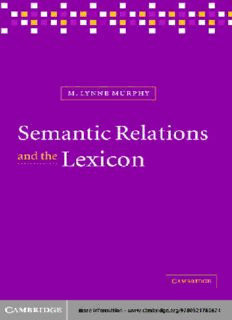
Semantic Relations and the Lexicon: Antonymy, Synonymy and other Paradigms PDF
Preview Semantic Relations and the Lexicon: Antonymy, Synonymy and other Paradigms
This page intentionally left blank SemanticRelationsandtheLexicon SemanticRelationsandtheLexiconexploresthemanyparadigmaticsemantic relationsbetweenwords,suchassynonymy,antonymyandhyponymy,and theirrelevancetothementalorganizationofourvocabularies.Drawingona century’sresearchinlinguistics,psychology,philosophy,anthropologyand computerscience,LynneMurphyproposesanew,pragmaticapproachtothese relations. Whereas traditional approaches to the lexicon have claimed that paradigmaticrelationsarepartofourlexicalknowledge,DrMurphyargues thattheyconstitutemetalinguisticknowledge,whichcanbederivedthrough asinglerelationalprinciple,andmayalsobestoredaspartofourconceptual representation of a word. Part I shows how this approach can account for thepropertiesoflexicalrelationsinwaysthattraditionalapproachescannot, andPartIIexaminesparticularrelationsindetail.Thisbookwillserveasan informative handbook for all linguists and cognitive scientists interested in thementalrepresentationofvocabulary. lynne murphy is Lecturer in Linguistics and English Language at the University of Sussex, with research interests in the structure of the mental lexicon, gradable adjective meaning, and psycho-social constraints on the semanticdevelopmentofsocialgrouplabels. Semantic Relations and the Lexicon Antonymy, Synonymy, and Other Paradigms M.LynneMurphy UniversityofSussex Cambridge, New York, Melbourne, Madrid, Cape Town, Singapore, São Paulo Cambridge University Press The Edinburgh Building, Cambridge , United Kingdom Published in the United States of America by Cambridge University Press, New York www.cambridge.org Information on this title: www.cambridge.org/9780521780674 © M. Lynne Murphy 2003 This book is in copyright. Subject to statutory exception and to the provision of relevant collective licensing agreements, no reproduction of any part may take place without the written permission of Cambridge University Press. First published in print format 2003 - isbn-13 978-0-511-06899-7 eBook (EBL) - isbn-10 0-511-06899-9 eBook (EBL) - isbn-13 978-0-521-78067-4 hardback - isbn-10 0-521-78067-5 hardback Cambridge University Press has no responsibility for the persistence or accuracy of s for external or third-party internet websites referred to in this book, and does not guarantee that any content on such websites is, or will remain, accurate or appropriate. ForMom,Dad,andGeorgia Contents Acknowledgments pageviii Symbolsandtypographicalconventions ix PartI Paradigmaticrelations,generally 1. Whylexicalrelations? 3 2. Apragmaticapproachtosemanticrelations 25 3. Otherapproaches 61 PartII Paradigmaticrelations,specifically 4. Synonymyandsimilarity 133 5. Antonymyandcontrast 169 6. Hyponymy,meronymy,andotherrelations 216 7. Lexiconandmetalexicon:implicationsandexplorations 237 Appendix:Relationelements 243 Notes 245 References 254 Index 274 vii Acknowledgments The theoretical perspective developed in this work is the great-great grand- daughterandsecondcousinthriceremovedofideaspresentedinmydoctoral dissertation. My first thanks thus go to my committee, Georgia Green, Jerry Morgan, Greg ‘No Relation’ Murphy, and Ladislav Zgusta, for their roles in gettingtheseideasgoing. Since then, I have enjoyed the kind attention of many who have read and commented upon drafts of various sections, particularly Roger Chaffin, RichardCoates,AlanCruse,LarryHorn,SteveJones,AdrienneLehrer,Wiltrud Mihatsch,CaritaParadis,GeoffSampson,andanonymousreviewers.Theirad- vice was always appreciated – and almost always followed. Darren Pearce helpedimmenselywithsomeimprovisedcorpussoftware.Apologiestothose whosecontributionshavegoneunnoticedhere,andabjectapologiestoanyone whosecommentsImayhavemisrepresented.Thereisnoonebutmetoblame foranyfaultsinthiswork. Christine Bartels and Andrew Winnard have been attentive, helpful, and graciouseditorsatthebeginningandendofthisproject,respectively.Baylor Universityprovidedfundingintheearlieststages,andtheDictionarySocietyof NorthAmerica’sUrdangAwardsupportedtheresearchonsynonymy.Friends andfamilysupportedthisworkwiththeirencouragement,guilt-trips,anddis- tractions.Duringthewriting,AllisonSmithandStanAppswerecentralchar- actersinalloftheabove.PhilVinertookcenterstageintheeditingstage,and forthatIwillalwaysbethankful. This book is dedicated to Georgia Green, who shaped the way I write and inspiredthewayIsupervisemyownstudents,andtomyparents,Nancyand PaulMurphy,whotaughtmetofinishwhatIstart–evenifithastakenaslong as one of Dad’s home-improvement projects. Thank you Georgia, Mom, and Dad. viii
Description: